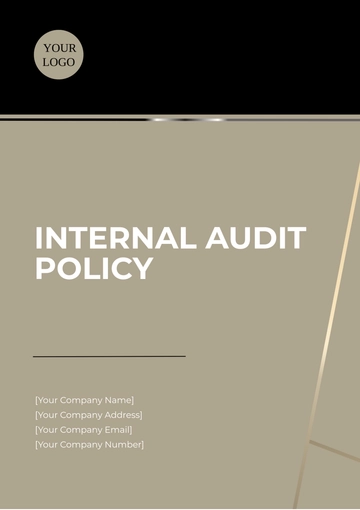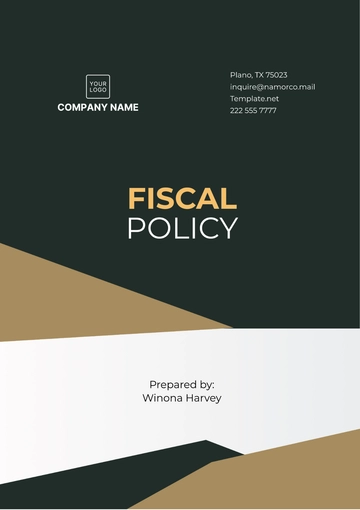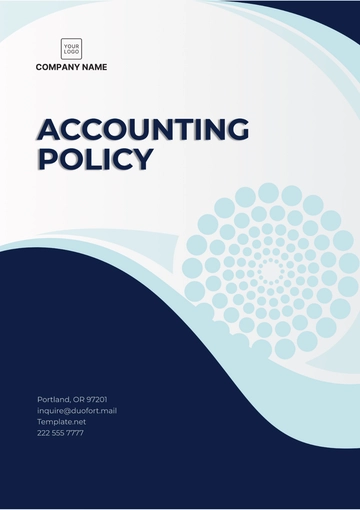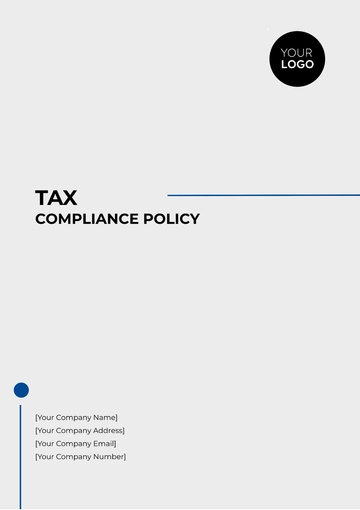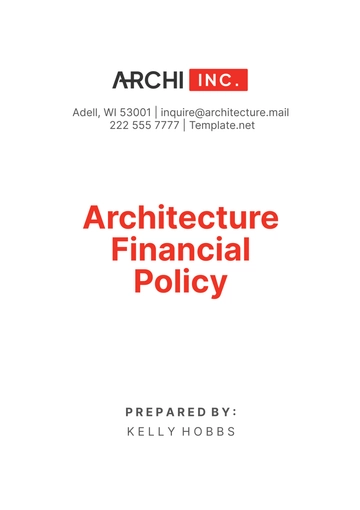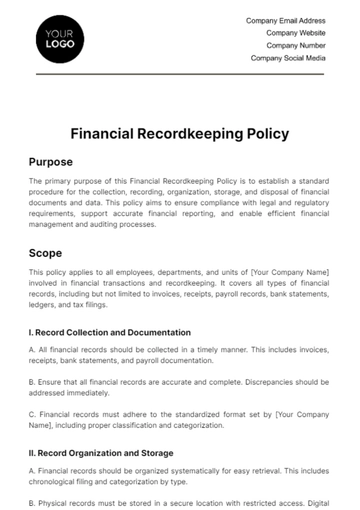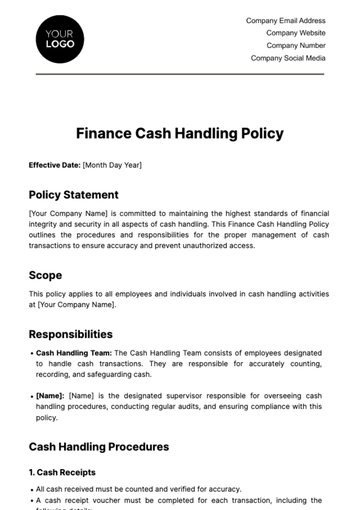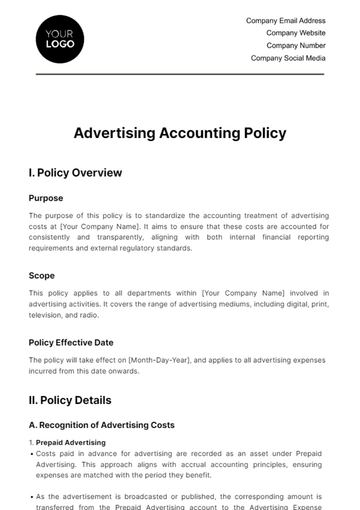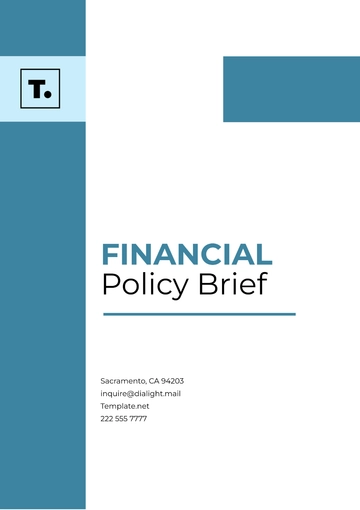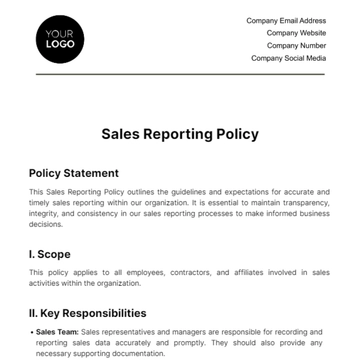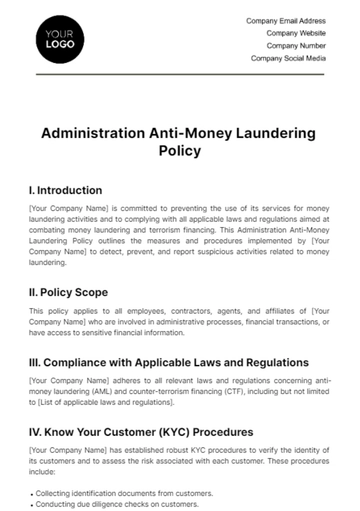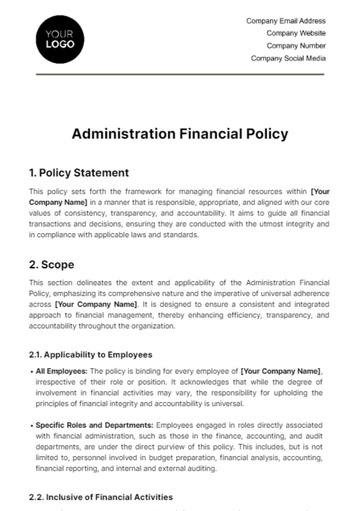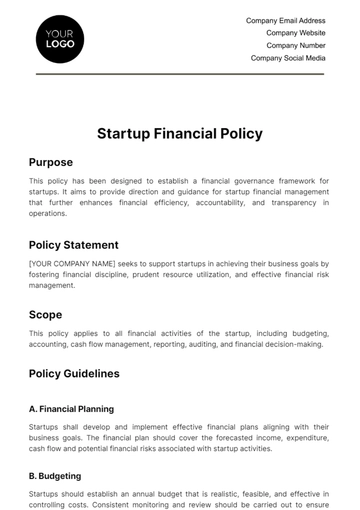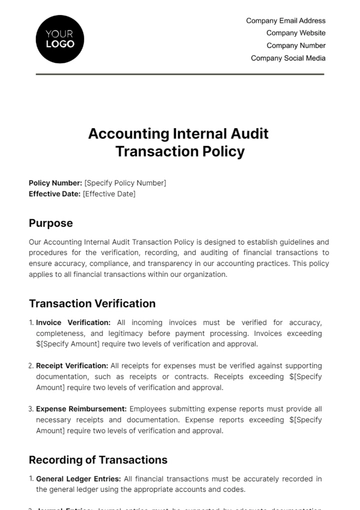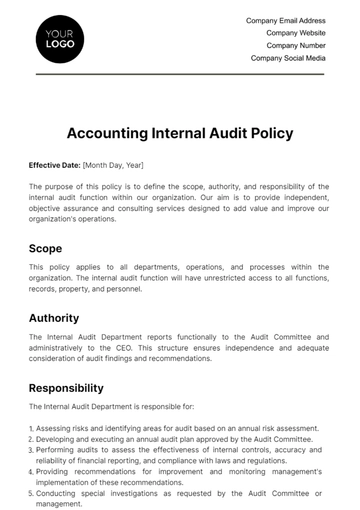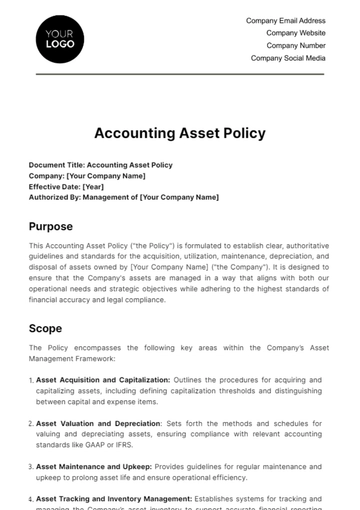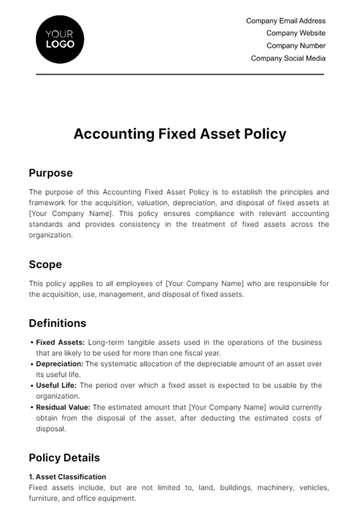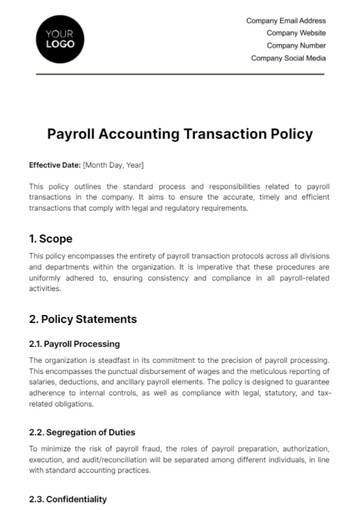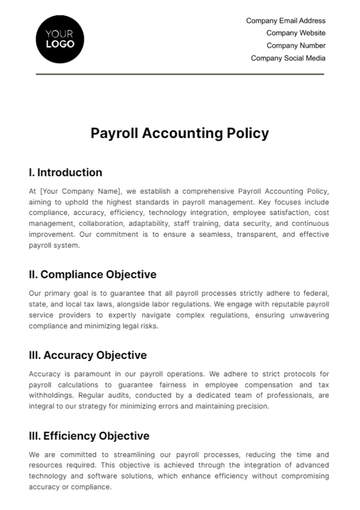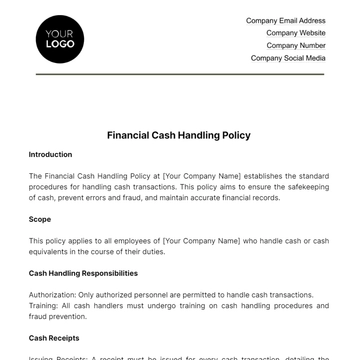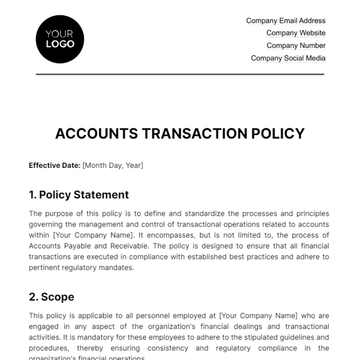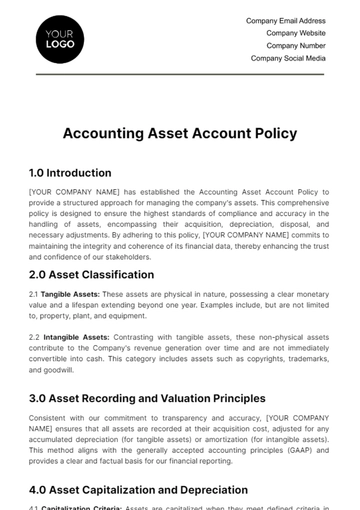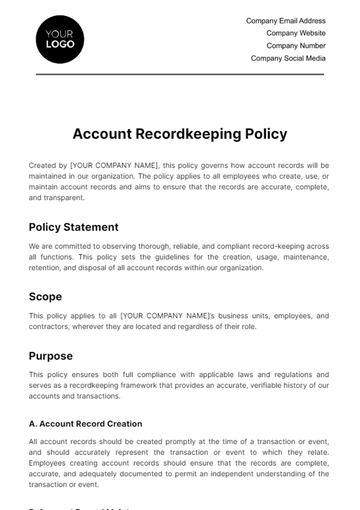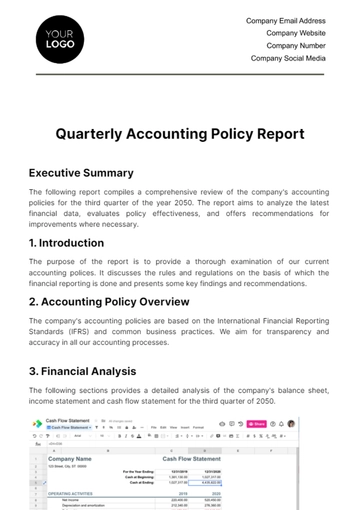Free Accounting Policy
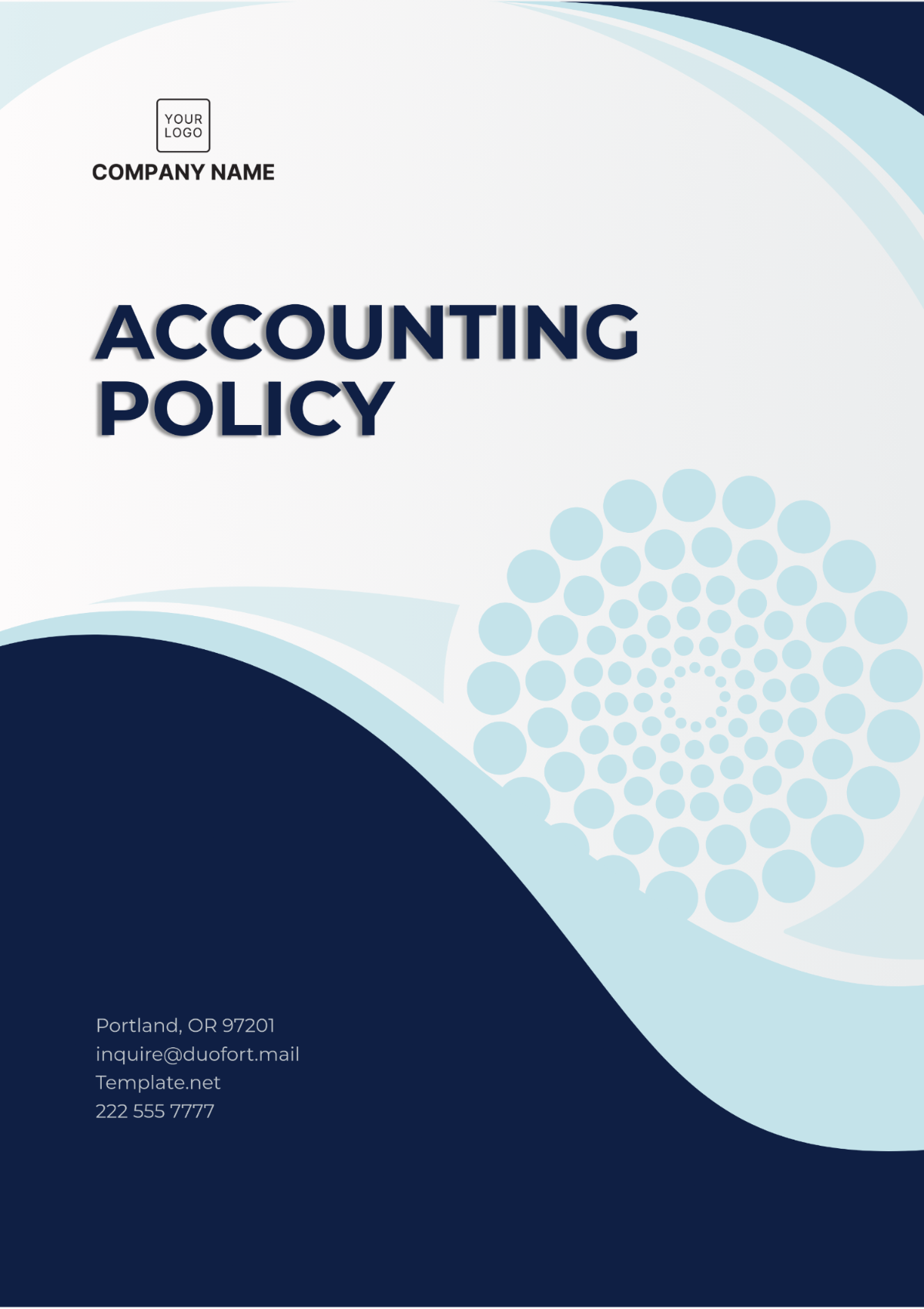
I. Introduction
The purpose of this Accounting Policy is to establish clear guidelines and procedures for managing financial transactions and reporting within [Your Company Name]. This policy aims to ensure consistency, accuracy, and compliance with relevant accounting standards and regulations, including Generally Accepted Accounting Principles (GAAP) and the Financial Accounting Standards Board (FASB) guidelines. By adhering to these standards, we maintain the integrity of our financial statements, safeguard company assets, and provide transparency to stakeholders.
Effective accounting practices are crucial for the financial health and operational efficiency of [Your Company Name]. This policy outlines the responsibilities of our accounting department, internal controls, and reporting procedures. It is designed to foster an environment of accountability and accuracy, ensuring that all financial transactions are recorded and reported in a timely and accurate manner. This policy also provides a framework for periodic audits and reviews to identify and rectify any discrepancies or inefficiencies, thereby supporting the overall financial stability and regulatory compliance of our company.
II. Scope
This policy applies to all financial transactions and accounting practices conducted by the company. It includes but is not limited to:
Revenue recognition
Expense reporting
Asset management
Liability and equity management
Financial reporting and disclosures
III. Accounting Principles
All accounting activities at [Your Company Name] must adhere to the following fundamental principles to ensure the integrity and reliability of our financial reporting:
Consistency: To maintain comparability and reliability in financial reporting, all accounting methods and procedures must be consistently applied across reporting periods. This involves using uniform accounting policies and practices for similar transactions and events. Consistency in financial reporting helps stakeholders to better understand and analyze financial statements over time, thereby enhancing the credibility and usefulness of the financial information presented.
Accuracy: It is imperative that all financial information recorded by [Your Company Name] is accurate and free from errors. This principle requires meticulous attention to detail and thorough verification processes to ensure that all financial transactions are recorded correctly. Accurate financial information not only supports effective decision-making but also ensures compliance with legal and regulatory requirements. Regular reconciliations and internal reviews are essential to detect and correct any inaccuracies promptly.
Completeness: All relevant financial information must be fully recorded to provide a comprehensive view of the company’s financial position and performance. Completeness entails capturing all transactions and events that affect the financial statements, including revenues, expenses, assets, and liabilities. Incomplete financial records can lead to misinformed decisions and regulatory non-compliance, undermining the overall financial integrity of the company.
Timeliness: Financial transactions must be recorded in a timely manner to ensure that financial statements reflect the most current and relevant information. Timeliness in accounting practices helps in the accurate and prompt preparation of financial reports, which is crucial for effective management, compliance with reporting deadlines, and responsiveness to financial inquiries or audits. Timely recording of transactions also aids in maintaining operational efficiency and achieving strategic business objectives.
Transparency: All financial practices and transactions should be conducted with transparency and openness. This principle involves providing clear and accessible financial information to stakeholders and subjecting financial practices to regular audits and reviews. Transparency ensures that financial operations are conducted ethically and in accordance with established standards, fostering trust and accountability among investors, regulatory bodies, and other stakeholders.
By adhering to these accounting principles, [Your Company Name] ensures robust financial management and reporting practices, supporting the company’s commitment to accuracy, accountability, and regulatory compliance.
IV. Revenue Recognition
Revenue recognition at [Your Company Name] adheres to the principle that revenue is recognized when it meets specific criteria to ensure that it reflects the actual economic activity and financial performance of the company.
Earned and Realizable: Revenue is recognized when it is both earned and realizable. This means that the company has substantially completed the activities necessary to earn the revenue, and there is a reasonable expectation that payment will be collected. For example, revenue from sales of goods is recognized when the goods are shipped, and revenue from services is recognized when the services are fully rendered.
Delivery of Goods or Services: Revenue is recorded only after the goods have been delivered or the services have been provided. This ensures that the revenue recognized corresponds directly to the performance obligations fulfilled. In cases where goods are delivered or services are rendered over time, revenue should be recognized proportionally as the performance obligations are satisfied.
Reasonable Assurance of Payment: There must be reasonable assurance that payment will be received for the goods or services provided. This includes assessing the creditworthiness of the customer and the likelihood of payment collection. Revenue is not recognized until there is a high level of confidence that the transaction will result in payment.
V. Expense Reporting
At [Your Company Name], accurate and thorough expense reporting is crucial for maintaining financial integrity and ensuring effective cost management. All expenses must be reported in a manner that reflects their true nature and aligns with the company’s accounting policies.
Incurred Costs and Expenditures: All costs and expenditures must be fully documented and reported. This includes not only direct costs associated with business operations but also any indirect costs that impact the company's financial position. Detailed records should be maintained for each expense, including receipts, invoices, and other supporting documentation. This comprehensive approach ensures that all incurred expenses are captured and reflected in the financial statements, providing an accurate picture of the company's financial obligations.
Proper Categorization of Expenses: Expenses must be categorized correctly according to their nature and purpose. Proper categorization is essential for accurate financial reporting and analysis. This involves classifying expenses into appropriate categories such as administrative, operational, or capital expenses. Accurate categorization helps in tracking spending patterns, budgeting, and financial forecasting, as well as ensuring compliance with tax and regulatory requirements.
Approval from Authorized Personnel: For significant expenses, prior approval from authorized personnel is required. This control measure ensures that large or unusual expenditures are reviewed and authorized before they are incurred, preventing unauthorized spending and ensuring alignment with the company’s budget and strategic goals. Approval processes should include verification of the necessity and reasonableness of the expense, and proper documentation should be retained for audit purposes.
VI. Asset Management
Effective asset management is critical for maintaining the value and utility of [Your Company Name]'s resources. Assets must be classified and managed according to their specific characteristics to ensure accurate accounting and efficient use. Proper asset management practices help in optimizing resource allocation and financial reporting.
Assets must be classified appropriately and managed according to their type:
Asset Type | Management Practices |
|---|---|
Current Assets | Recorded and monitored regularly due to their short-term nature. |
Fixed Assets | Regularly assessed for depreciation and impairment. |
Intangible Assets | Amortized over their useful life and regularly reviewed for valuation. |
Accurate management and classification of assets are crucial for reflecting the true financial position of [Your Company Name] and supporting effective asset utilization and strategic planning.
VII. Liability and Equity Management
Effective management of liabilities and equity is essential for maintaining the financial stability and integrity of [Your Company Name]. Proper recording and oversight ensure that financial obligations and ownership interests are accurately reflected in the company's financial statements.
Liabilities: All liabilities, including both short-term and long-term debts, must be recognized and recorded accurately. Short-term liabilities, such as accounts payable and accrued expenses, should be recorded promptly to reflect the company’s immediate obligations. Long-term liabilities, including bonds payable and long-term loans, must be recorded and monitored to ensure timely repayment and compliance with debt covenants. Accurate recording of liabilities helps in managing cash flow, planning for future financial commitments, and ensuring compliance with financial and regulatory requirements.
Equity: Equity transactions, including the issuance and repurchase of stock, must be recorded meticulously. Issuances of new shares or stock options should be recorded at their fair value, and any associated costs should be accurately reflected. Repurchases of stock, also known as treasury stock transactions, should be recorded at the cost of repurchase and tracked for proper accounting. Managing equity transactions properly ensures that shareholders' interests are accurately represented and that any changes in ownership structure are properly documented.
VIII. Financial Reporting and Disclosures
Financial reporting at [Your Company Name] is guided by strict adherence to regulatory requirements and accounting standards to ensure transparency, accuracy, and reliability. Comprehensive financial reporting and disclosure practices are essential for providing stakeholders with a clear and truthful view of the company’s financial health and operational performance.
Timely and Accurate Financial Statement Preparation: It is imperative that financial statements are prepared and submitted in a timely manner, reflecting the most current and accurate financial information. This involves the preparation of balance sheets, income statements, cash flow statements, and statements of changes in equity. The statements should be free from material misstatements and prepared in accordance with Generally Accepted Accounting Principles (GAAP) or other applicable accounting standards. Timely reporting supports effective decision-making by management and ensures compliance with regulatory deadlines.
Disclosure of Significant Accounting Policies and Practices: All significant accounting policies and practices must be disclosed in the financial statements. This includes details about the methods used for revenue recognition, asset valuation, and expense recognition. Transparent disclosure of accounting policies provides stakeholders with insight into the basis for financial reporting and helps in understanding how financial results are derived.
Inclusion of Relevant Financial Notes and Supplementary Information: Financial statements should include all relevant notes and supplementary information that provide context and detail about the figures reported. This includes disclosures about contingent liabilities, related party transactions, and significant events occurring after the balance sheet date. Comprehensive notes and supplementary information enhance the clarity and completeness of financial reporting, enabling stakeholders to make informed judgments about the company’s financial position and performance.
IX. Compliance and Review
To uphold the integrity and effectiveness of our accounting practices, [Your Company Name] will establish a regular review process to ensure compliance with this Accounting Policy. This process will include both internal and external audits designed to evaluate adherence to policy guidelines and identify areas for improvement. Internal audits will be conducted periodically by our internal audit team to review financial transactions, accounting practices, and adherence to internal controls. These audits aim to detect any discrepancies, ensure compliance with accounting standards, and assess the effectiveness of our internal control systems.
External audits will be performed by qualified independent auditors to provide an objective assessment of our financial statements and compliance with regulatory requirements. These audits will offer an additional layer of assurance to stakeholders regarding the accuracy and reliability of our financial reporting. The findings from both internal and external audits will be reviewed by senior management, and any identified issues will be addressed promptly. Regular reviews and audits ensure that [Your Company Name] maintains high standards of financial integrity and continues to meet regulatory and policy requirements effectively.
X. Policy Review and Updates
This accounting policy will be reviewed annually or as required to ensure its continued relevance and compliance with applicable standards and regulations. Any updates or changes will be communicated to all relevant stakeholders.
Approved by: | Board of Directors |
Effective Date: | 01/01/2060 |
Next Review Date: | 01/01/2061 |
- 100% Customizable, free editor
- Access 1 Million+ Templates, photo’s & graphics
- Download or share as a template
- Click and replace photos, graphics, text, backgrounds
- Resize, crop, AI write & more
- Access advanced editor
Ensure compliance with our Accounting Policy Template from Template.net. This editable and customizable template helps you establish clear accounting procedures. Easily editable in our Ai Editor Tool, you can adapt it to fit your organization's specific policy needs.
You may also like
- HR Policy
- Restaurant Policy
- Company Policy
- Accounting Policies and Procedures
- Website Policy
- Privacy Policy
- Safety Policy
- School Policy
- IT and Software Policy
- Law Firm Policy
- Construction Policy
- Interior Design Policy
- Travel Agency Policy
- Education Academic Policy
- Security Policy
- Real Estate Policy
- Expense Policy
- Software Policy

